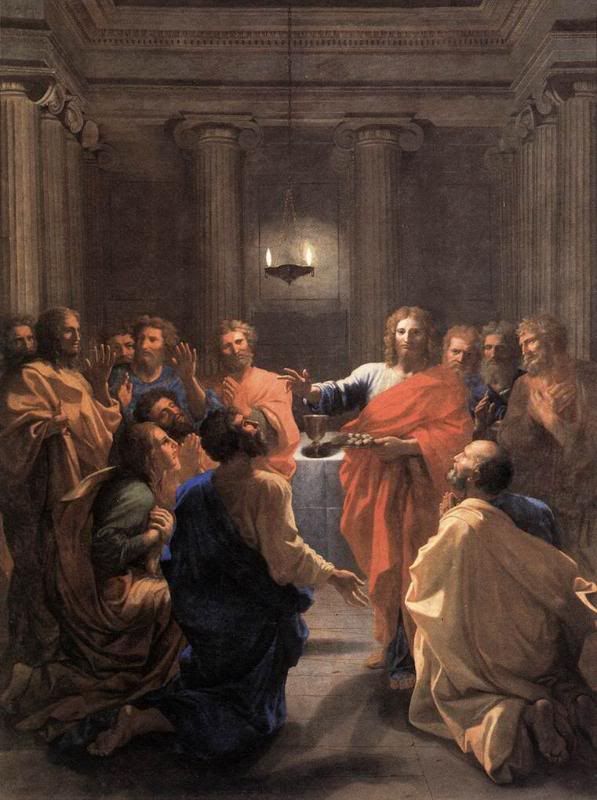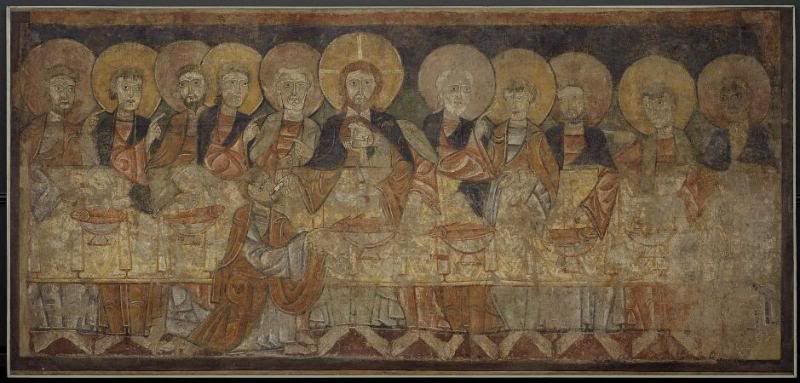The Last Supper was a moment of love, a stunning moment of self-giving prior to the pain, sorrow, and sacrifice that Jesus would endure for us. In that moment of love, Jesus instituted the Holy Eucharist, which we continue to celebrate as the Body of Christ.
22While they were eating, Jesus took bread, gave thanks and broke it, and gave it to his disciples, saying, "Take it; this is my body."
23Then he took the cup, gave thanks and offered it to them, and they all drank from it.
24"This is my blood of the covenant, which is poured out for many," he said to them. 25"I tell you the truth, I will not drink again of the fruit of the vine until that day when I drink it anew in the kingdom of God." (Mark 14: 22-25)
In consecrating the bread and wine he presented for His disciples, Jesus accomplished two tasks. First, He literally and physically became the Bread of Life for us, as He first preached, recorded in the Gospel of John:
35Then Jesus declared, "I am the bread of life. He who comes to me will never go hungry, and he who believes in me will never be thirsty. 36But as I told you, you have seen me and still you do not believe. 37All that the Father gives me will come to me, and whoever comes to me I will never drive away. 38For I have come down from heaven not to do my will but to do the will of him who sent me. 39And this is the will of him who sent me, that I shall lose none of all that he has given me, but raise them up at the last day. 40For my Father's will is that everyone who looks to the Son and believes in him shall have eternal life, and I will raise him up at the last day."
 53Jesus said to them, "I tell you the truth, unless you eat the flesh of the Son of Man and drink his blood, you have no life in you. 54Whoever eats my flesh and drinks my blood has eternal life, and I will raise him up at the last day. 55For my flesh is real food and my blood is real drink. 56Whoever eats my flesh and drinks my blood remains in me, and I in him. 57Just as the living Father sent me and I live because of the Father, so the one who feeds on me will live because of me. 58This is the bread that came down from heaven. Your forefathers ate manna and died, but he who feeds on this bread will live forever." (John 6: 35-40, 53-58)
53Jesus said to them, "I tell you the truth, unless you eat the flesh of the Son of Man and drink his blood, you have no life in you. 54Whoever eats my flesh and drinks my blood has eternal life, and I will raise him up at the last day. 55For my flesh is real food and my blood is real drink. 56Whoever eats my flesh and drinks my blood remains in me, and I in him. 57Just as the living Father sent me and I live because of the Father, so the one who feeds on me will live because of me. 58This is the bread that came down from heaven. Your forefathers ate manna and died, but he who feeds on this bread will live forever." (John 6: 35-40, 53-58)But secondly, we all became the Body of Christ. By partaking in the Eucharist, we “acknowledge the body” as Saint Paul wrote to the Corinthians:
27Therefore, whoever eats the bread or drinks the cup of the Lord in an unworthy manner will be guilty of sinning against the body and blood of the Lord. 28A man ought to examine himself before he eats of the bread and drinks of the cup. 29For anyone who eats and drinks without recognizing the body of the Lord eats and drinks judgment on himself. (1 Corinthians 11: 27-29)
In participating in the Eucharist, we receive the generous gift of life from our Savior, but we also are called to give generously to one another—to love one another as Christ, Himself, has loved us. In becoming the body of Christ, we enter into communion not only with Him, but with the Father, and with each other—a powerful agape, participation in the mystery and divinity of Jesus, one body in His name.
 16Is not the cup of thanksgiving for which we give thanks a participation in the blood of Christ? And is not the bread that we break a participation in the body of Christ? 17Because there is one loaf, we, who are many, are one body, for we all partake of the one loaf. (1 Corinthians 10:16-17)
16Is not the cup of thanksgiving for which we give thanks a participation in the blood of Christ? And is not the bread that we break a participation in the body of Christ? 17Because there is one loaf, we, who are many, are one body, for we all partake of the one loaf. (1 Corinthians 10:16-17)In the Eucharist we are called home to the Lord, while remaining in community with each other. We are made one with the Word of God, incarnate, living and tangible. We are renewed in our faith and experience the divinity of Christ. We share in His mystery. We are forgiven. And we are loved.












0 comments:
Post a Comment
Thanks for leaving a comment. If you wish to submit a prayer request, however, please do so above, using the "Contact" tab.